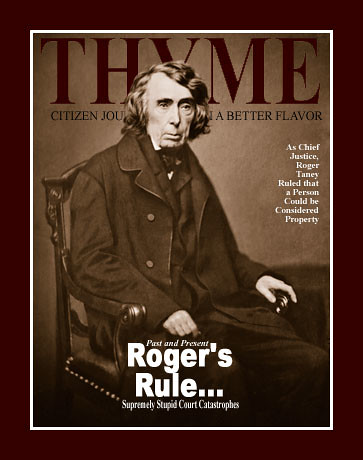
Volume IV, Issue XXVII
"Robert's Rules" or Roger's Rule
The "other" Weekly News Magazine [click to read] reports this week on the recent Supreme Court decision and the role of Chief Justice John Roberts. For fifteen pages they lavish praise for this "brilliant" decision.
Brilliant Decision? Consider the case of Dred Scott, now cited as the ultimate example of a bad decision. When it comes to precedent cases, the court's record is less than stellar:
"Dred Scott v. Sandford, 60 U.S. 393 (1857), also known as the Dred Scott Decision, was a ruling by the U.S. Supreme Court that people of African descent brought into the United States and held as slaves (or their descendants, whether or not they were slaves) were not protected by the Constitution and were not U.S. citizens. Since passage of the 14th Amendment to the U.S. Constitution, the decision has not been a precedent case, but retains historical significance as perhaps the worst decision ever made by the Supreme Court."
In March of 1857, the United States Supreme Court, led by Chief Justice Roger B. Taney, (pronounced TAW-NEE), declared that all blacks -- slaves as well as free -- were not and could never become citizens of the United States. The court also declared the 1820 Missouri Compromise unconstitutional, thus permiting slavery in all of the country's territories.
The case before the court was that of Dred Scott v. Sanford. Dred Scott, a slave who had lived in the free state of Illinois and the free territory of Wisconsin before moving back to the slave state of Missouri, had appealed to the Supreme Court in hopes of being granted his freedom.
Taney -- a staunch supporter of slavery and intent on protecting southerners from northern aggression -- wrote in the Court's majority opinion that, because Scott was black, he was not a citizen and therefore had no right to sue. The framers of the Constitution, he wrote, believed that blacks "had no rights which the white man was bound to respect; and that the negro might justly and lawfully be reduced to slavery for his benefit. He was bought and sold and treated as an ordinary article of merchandise and traffic, whenever profit could be made by it."
Referring to the language in the Declaration of Independence that includes the phrase, "all men are created equal," Taney reasoned that "it is too clear for dispute, that the enslaved African race were not intended to be included, and formed no part of the people who framed and adopted this declaration. . . ."
Abolitionists were incensed. Although disappointed, Frederick Douglass, found a bright side to the decision and announced, "my hopes were never brighter than now." For Douglass, the decision would bring slavery to the attention of the nation and was a step toward slavery's ultimate destruction. -- PBS [1.]
The framers of our founding documents though, had wisely changed the definition of G-d given rights from John Locke's "Life, Liberty and Property" to "Life, Liberty and the Pursuit of Happiness," thus sowing the seeds for invoking a higher principle in the eventual overturning of slavery.
The 'Right' of Privacy
More recently, in the case of Roe vs. Wade, the court overturned state laws protecting unborn children from abortion, citing a 'right of privacy.' The decision is generally considered poor law, though Pro-choice advocates still stand by it. One has to wonder though, since anyone rushing to aid an endangered child behind a sea of "No Tresspassing" signs would in all likelihood be lauded as a hero rather than arrested for tresspassing.
If it Walks like a Mandate...
No doubt, the recent decision to recast the healthcare mandate as a tax creates vast powers for the Federal government. Using such logic, I can now be legally taxed for not buying a Prius, or not buying a salad at McDonalds. The distinct possibility of Nanny State gone wild exists in the tax code.
There is power in a name. Because the legislation has been dubbed "healthcare," a vote against it has been cast as a vote against healthcare! Nothing could be further from the truth!
I have read enough of the legislation to see that it is heavy on creating mechanisms to generate new revenue (16,500 new IRS agents), and lean on actual reform. [2.] It shuns market driven reforms and sets up the mechanisms for rationing care. In addition, there will be mandates for "Reproductive Health Services" (read Abortion), that will be an intrusion into the religious liberty of certain institutions. CBO Director Douglas W. Elmendorf says of the legislation:
"CBO has not completed an estimate of all of the discretionary costs that would be associated with H.R. 3590. … [S]uch costs would probably include an estimated $5 billion to $10 billion over 10 years for administrative costs of the Internal Revenue Service (IRS)."
The media coverage of this vote has continued to drown out the voices of those who would offer a more reasoned and specific package of reforms. Here are a series of articles by David Karaffa outlining real reforms requiring minimal legislation:
Real Health Care Reform Secrets (Part 1) [click to read]
Real Health Care Reform Secrets (Part 2) [click to read]
Real Health Care Reform Secrets (Part 3) [click to read]
Real Health Care Reform Secrets (Part 4) [click to read]





No comments:
Post a Comment